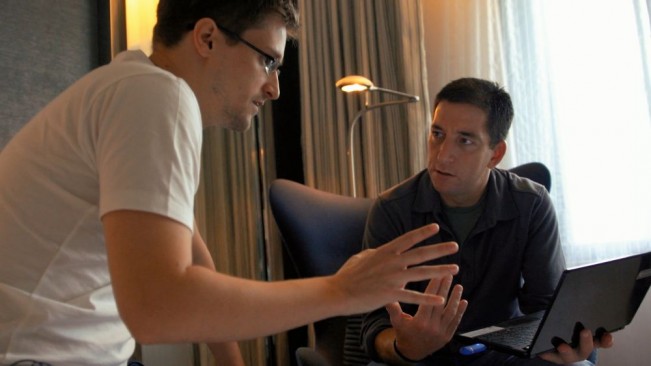

By Ray Pride Pride@moviecitynews.com
A Compendium Of Conversations With Laura Poitras And Edward Snowden About CITIZENFOUR
Edward Snowden introduces CITIZENFOUR at Leipzig Doc.
Laura Poitras: “I began documenting something in an observational way and then got pulled into the history that I was documenting. That certainly happened when I was put on a watch list by the U.S. government and began to be detained at borders. But it wasn’t just because I was put on a watch list that I was interested in surveillance. Over the course of my films, I’ve shifted from thinking that the pendulum swung in one direction after 9/11 and would swing back, to being less naive about the choices that were made. Surveillance is one of the ways the national-security state expanded after 9/11. I always thought that, after doing the Guantanamo film, I wanted to do something to bring the story home, and surveillance is set in the U.S. But it seemed like a tough theme to approach in a documentary because it’s hidden.” Conor Friedersdorf talks to Laura Poitras
Laura Poitras: “It was clear that the film would be told from a subjective point of view, that I would tell it in first person. I chose to be the narrator, so I am the person who takes the audience on this journey and introduces the audience to all the people in the film. In terms of choice, it partly has to do with the fact that I do my own filming. In many cases I am behind the camera. Sometimes I work with a camera person, but the majority of the time I’m working in the field alone. I didn’t want the film to be a personal essay. We did some edits where there was more of me in it and then it felt like a personal essay and it lost a bit of the rich, layered structure of using scenes shot vérité to build the narrative. I’m really interested in pulling people into a story using scenes as the building blocks to tell the narrative. Many of the cards are told in first person: you hear my voice and you do see me in reflections. It is clear there is somebody behind the camera who is a participant in what’s unfolding.” Laura Almo talks to Laura Poitras
 Edward Snowden: “I don’t spend all day running hand-on-hat from shadowy figures—I’m in exile. My government revoked my passport intentionally to leave me exiled. If they really wanted to capture me, they would’ve allowed me to travel to Latin America… They did not want that; they chose to keep me in Russia. People forget how I ended up in Russia. They waited until I departed Hong Kong to cancel my passport in order to trap me in Russia, because it’s the most effective attack they have against me, given the political climate in the United States. If they can show I’m in Russia and pretend that I wear ‘I Heart Putin’ shirts… You would be surprised how effective, at least for influencing low-information voters, negative propaganda about me is. Maybe boutique media, maybe people who are reading papers and talking to academics and whatnot, maybe they understand, because they’re high-information. But a lot of people are still unaware that I never intended to end up in Russia. They’re not aware that journalists were live-tweeting pictures of my seat on the flight to Latin America I wasn’t able to board because the US government revoked my passport. There are even a few who still honestly believe I sold information to Putin—like personally, in exchange for asylum. And this is after the Senate Intelligence Committee chair, who gets to read the NSA’s reporting on my activities every morning, said all of these conspiracies are delusional.”
Edward Snowden: “I don’t spend all day running hand-on-hat from shadowy figures—I’m in exile. My government revoked my passport intentionally to leave me exiled. If they really wanted to capture me, they would’ve allowed me to travel to Latin America… They did not want that; they chose to keep me in Russia. People forget how I ended up in Russia. They waited until I departed Hong Kong to cancel my passport in order to trap me in Russia, because it’s the most effective attack they have against me, given the political climate in the United States. If they can show I’m in Russia and pretend that I wear ‘I Heart Putin’ shirts… You would be surprised how effective, at least for influencing low-information voters, negative propaganda about me is. Maybe boutique media, maybe people who are reading papers and talking to academics and whatnot, maybe they understand, because they’re high-information. But a lot of people are still unaware that I never intended to end up in Russia. They’re not aware that journalists were live-tweeting pictures of my seat on the flight to Latin America I wasn’t able to board because the US government revoked my passport. There are even a few who still honestly believe I sold information to Putin—like personally, in exchange for asylum. And this is after the Senate Intelligence Committee chair, who gets to read the NSA’s reporting on my activities every morning, said all of these conspiracies are delusional.”
From yet another lengthy, lucid interview in Moscow with the Nation’s Katrina vanden Heuvel and Stephen F. Cohen














